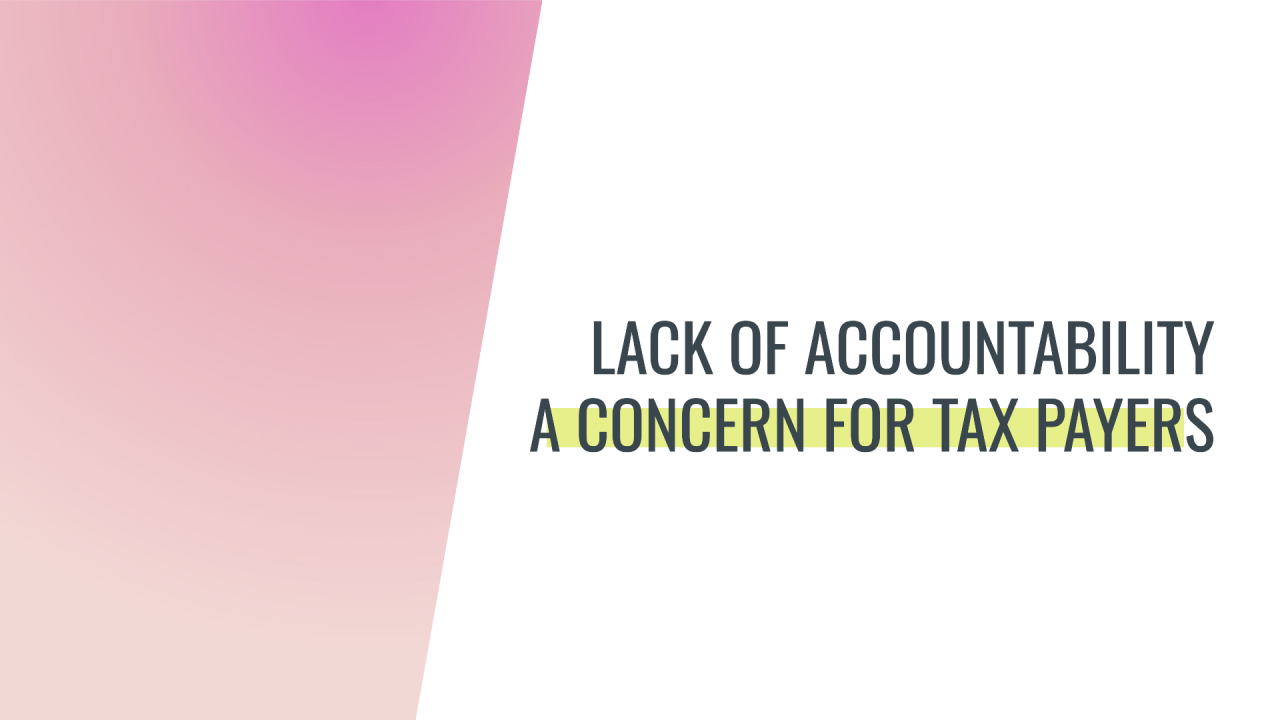Lack Of Police Accountability: Campaigners Express Deep Worry

Table of Contents
Insufficient Investigations into Police Misconduct
Inadequate investigations into police misconduct are a major contributor to the lack of accountability. Internal affairs departments, often tasked with investigating allegations of police brutality and other forms of misconduct, are frequently criticized for being ineffective, biased, and lacking in transparency. This creates a climate of impunity, where officers can operate with little fear of consequence.
- Flawed Investigations: Numerous cases illustrate how internal investigations fail to adequately address police misconduct. Insufficient evidence gathering, biased interviews, and a lack of thoroughness often lead to exonerations even when compelling evidence of wrongdoing exists. The outcome is a profound erosion of public trust.
- Lack of Independent Oversight: The absence of truly independent oversight mechanisms is a significant problem. Internal affairs units are often seen as lacking objectivity, operating within a culture that prioritizes protecting their own. Independent external review boards, with the power to conduct thorough, impartial investigations, are crucial for restoring public confidence.
- The "Blue Wall of Silence": The pervasive "blue wall of silence," an ingrained culture of loyalty and protection amongst police officers, actively hinders effective investigations. Officers are often reluctant to report misconduct committed by their colleagues, fearing retaliation or ostracization. Breaking this culture of silence is essential for fostering accountability.
- Insufficient Training: Inadequate training in proper investigative techniques contributes significantly to flawed investigations. Officers need comprehensive training on how to conduct impartial investigations, collect and preserve evidence, and handle witness interviews objectively.
Lack of Transparency and Public Access to Information
A lack of transparency surrounding police misconduct further exacerbates the problem. Restricted access to crucial information, such as police misconduct records and data, prevents the public from holding law enforcement accountable. This opacity fuels distrust and hinders efforts to identify patterns of misconduct and implement effective reforms.
- Limited Public Access: Many jurisdictions impose significant limitations on public access to police misconduct records, making it difficult to assess the true extent of the problem and identify officers with a history of complaints. This lack of readily available information hampers public scrutiny and oversight.
- The Promise of Body Cameras: Body-worn cameras offer a potential solution by providing an independent record of police interactions with the public. However, their effectiveness depends on policies ensuring proper use, data storage, and public access to footage in cases of alleged misconduct. Without proper implementation, body cameras become another tool for potential cover-up.
- Data Management Challenges: Accessing and analyzing police data is often hampered by poor data management and reporting practices. Inconsistent data collection and a lack of standardized reporting make it challenging to track trends, identify problematic officers, and evaluate the effectiveness of reform efforts. Improved data management is crucial for transparency and accountability.
- Best Practices from Other Jurisdictions: Some jurisdictions have implemented successful transparency initiatives, such as publicly releasing detailed data on police misconduct and providing easy access to relevant records online. These models can serve as examples for other areas striving for improved accountability.
Inadequate Sanctions and Punishments for Misconduct
Even when police misconduct is investigated and substantiated, the sanctions imposed are often inadequate, failing to deter future wrongdoing and sending a message that such behavior will not be seriously punished.
- Inconsistencies in Discipline: Current disciplinary processes for police officers are often inconsistent and lenient. Punishments for similar offenses can vary widely, depending on factors such as the officer's seniority, department policies, and the nature of the relationship between the officer and their superior. This inconsistency undermines public trust and encourages a culture of impunity.
- Need for Stronger Sanctions: Significantly stronger sanctions, including immediate dismissal for serious misconduct, criminal prosecutions where warranted, and civil penalties, are crucial deterrents. Currently, many officers face minimal consequences for serious violations.
- Restorative Justice Approaches: While punitive measures are essential, exploring restorative justice approaches, where appropriate, could complement them. Restorative justice aims to repair harm caused by misconduct and involve victims in the process.
- Impact of Weak Penalties: The current weakness of penalties not only fails to hold officers accountable but also sends a dangerous message that misconduct will be tolerated. This undermines public trust and increases the risk of future incidents of police brutality.
Campaigners' Calls for Reform and Increased Accountability
Grassroots movements and advocacy groups are leading the charge for significant police reform and increased accountability. They are demanding systemic changes to address the deep-rooted issues hindering justice and public safety.
- Advocacy Group Demands: Campaigners are advocating for a range of reforms, including the establishment of independent civilian review boards with investigatory and disciplinary powers, the implementation of independent prosecutions of police misconduct cases, and the creation of comprehensive data collection and reporting systems.
- Specific Policy Reforms: Specific policy changes being pushed for include mandating body cameras with strict guidelines, enhancing training on de-escalation techniques and implicit bias, and implementing early intervention systems to identify and address problematic officers.
- Community Engagement: Community engagement is vital in pushing for meaningful change. Community-led initiatives can create avenues for dialogue, identify specific issues impacting particular communities, and ensure that reform efforts address local concerns.
- Successful Examples: Several communities have successfully implemented community-led initiatives that have significantly improved police accountability and public trust. These examples show the potential for impactful change when community voices are heard.
Conclusion
The lack of police accountability is a critical issue threatening public safety and trust in law enforcement. Insufficient investigations, a lack of transparency, and inadequate sanctions create a system where police misconduct goes unpunished, fostering a climate of impunity. Campaigners are rightly expressing deep worry and demanding systemic change. The urgent need for reform is undeniable. We must demand greater police accountability through contacting our elected officials, supporting advocacy groups, participating in peaceful protests, and staying informed about relevant legislation. Demand greater police accountability. Your voice matters in creating a more just and equitable system.

Featured Posts
-
 Guardians Beat Yankees After Bibees First Inning Home Run
Apr 30, 2025
Guardians Beat Yankees After Bibees First Inning Home Run
Apr 30, 2025 -
 Superboul 2025 Zvyozdy Skandaly I Neozhidannosti
Apr 30, 2025
Superboul 2025 Zvyozdy Skandaly I Neozhidannosti
Apr 30, 2025 -
 Kamala Harris Broadway Speech A Word Salad
Apr 30, 2025
Kamala Harris Broadway Speech A Word Salad
Apr 30, 2025 -
 10th Straight Win For Cavaliers De Andre Hunters Key Role In Victory Against Trail Blazers
Apr 30, 2025
10th Straight Win For Cavaliers De Andre Hunters Key Role In Victory Against Trail Blazers
Apr 30, 2025 -
 Chainalysis Acquisition Of Alterya Expanding Ai Capabilities In Blockchain
Apr 30, 2025
Chainalysis Acquisition Of Alterya Expanding Ai Capabilities In Blockchain
Apr 30, 2025
